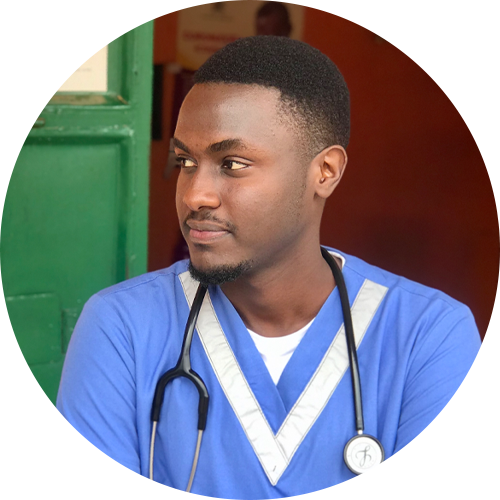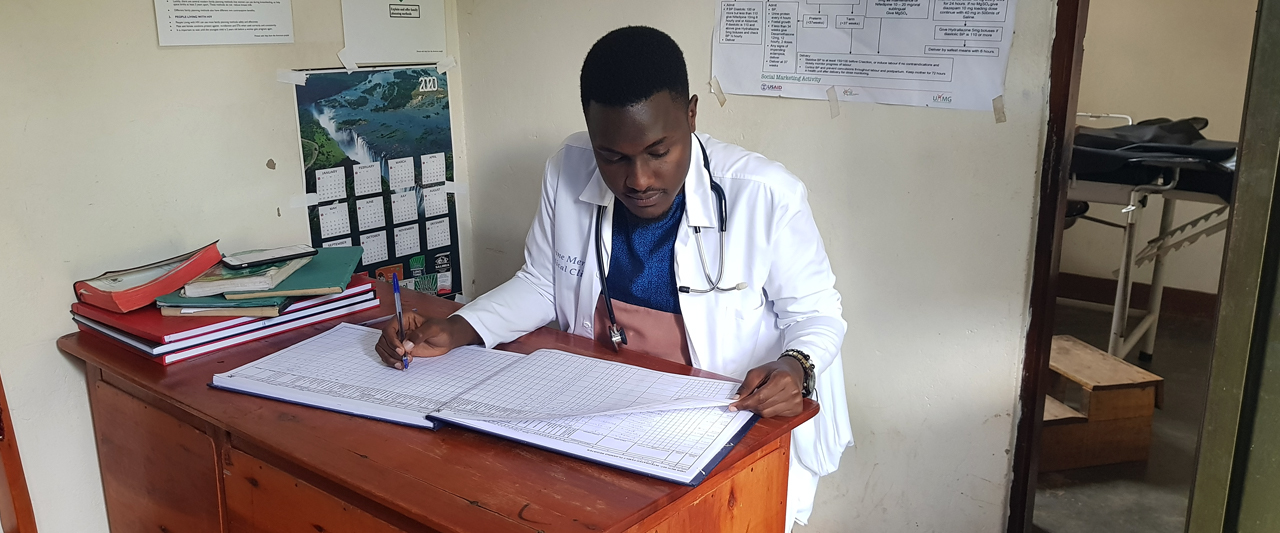‘We could put an end to these preventable deaths’
Kizza Blair is a fourth-year medical student in Uganda and a member of Medical Students for Choice. In this Q&A, we ask him about the value of safe abortion care and the impact of the Helms Amendment, a U.S. law that restricts U.S. foreign assistance funding for abortion services and disproportionately affects Black and brown women in low- and middle-income countries.

First things first—what experience or observation made you realize the importance of safe abortion care?
During my third year of medical school, my first rotation was obstetrics and gynecology. What I saw during that time changed my life for good. One experience in particular still haunts me. A young girl about 13 years of age was brought in as an emergency case around 2 a.m. while I was doing night call duty. She was unconscious and her short dress was heavily soaked in blood. I asked her grandmother what had happened, and all she could say was “dano ma dako onyo ic,” an Acholi statement that means “she aborted.” I tried desperately to cross-match and secure at least a unit of blood, but it was all in vain, and I watched her die helplessly. This young girl had inserted a stick into herself with the aim of terminating her pregnancy but had perforated her uterus. By the time her elder sister found her, she had passed out in a pool of blood. All of this was psychologically traumatizing for me, but later on I picked it up as a motivation to help other girls like her protect their futures by being able to access free and safe abortion care. That’s why I am an abortion advocate.
What do you see as the impact of restrictions on abortion, particularly from the Helms Amendment that, in effect, blocks U.S. funds from being used for anything related to abortion? If things were different, and clinics like the one you’re working in could get more funds, what would that mean?
Abortion is highly restricted in Uganda and there is a significant unmet need for safe abortion care. Women die due to abortion-related complications—obviously related to unsafe abortions. Currently, I am working at a local clinic in the western part of the country. With the outbreak of COVID-19 and the lockdown measures instituted by the government, there has been an increase in the number of teenage pregnancies. We see this in the number of school-going teenagers who walk in the clinic needing abortion care, and in others who are coming in with abortion-related complications. If things were different and there was more funding available, we would have the money to support more medical students getting training and experience in providing safe abortion care at these local clinics. We’d also be able to purchase more of the equipment needed for simulated trainings—and ultimately, we could put an end to these preventable deaths occurring day by day on our watch.
Tell us a bit about what you see as a medical student. Is there a lot of stigma around abortion? How are women and girls who seek abortion treated?
As a pro-choice medical student working in a country where abortion is legally restricted and quite often branded as murder, I see many cultural and opinion leaders condemning abortion, tagging it as evil. There is quite a lot of stigma around anything that is abortion-related, including providing counseling and information about abortion services. Women and girls who seek safe abortion are judged and stigmatized all the time, and I believe it’s a harsh and wrong practice resulting from people imposing their beliefs onto others. The more we stigmatize women and girls who seek abortion by condemning them or trying to steer them away from it, the more damage is done. Abortion care is time-sensitive and by the time someone walks into an abortion-providing clinic they have already made up their minds and the best we can do is support them throughout the process.
My personal experience on campus is that a lot of students know who I am because they have attended some of the trainings I have conducted, or perhaps because I assisted with referring one of their friends for a safe abortion at a local clinic. This has caused me to be branded with names like “abortionist” or “the man against unborn babies.” It has created a lot of stigma toward me, but at the same time, I do feel I have a safe space to express what I believe in as an individual without hiding or pretending I am not pro-choice.
You seem to be willing to speak about sometimes challenging topics—such as abortion, reproductive freedom and LGBTQ issues. Do you see these things as related?
Growing up we are often told what is good and bad, what is right and wrong, leaving no gray area. But I believe this is a wrong narrative which blindfolds our beliefs, creating a lot of differences. People have their own unique preferences, especially concerning issues of sexual and reproductive health and rights, and that should be embraced. We are in no position to discriminate against one another in lines of race, color, orientation, perspective and behavior. We all have a beating heart and blood flowing through our veins, which qualifies us as “one” and deserving of equal rights in our identity.


